I had the opportunity to travel to Fiji a number of years ago where I was fortunate to meet my friends Janis and John from New Zealand. We clicked instantly and it became a joint vacation of sorts. I can say many things of Janis: she is an artist in so many forms, a socio-anthropologist in her view of people, adventurous in spirit and with her time, warm and THE funniest person on the face of the planet. I do not ever remember laughing harder than during our time in Fiji.
We’ve finally had our first snow of the season and it made me wonder what Janis does for Christmas. After all it’s summer there. Despite having spent random Christmases in more temperate regions myself it seems it should be a winter holiday everywhere. It somehow seems perverse to imagine people in bikinis and enjoying the early season spoils of their gardens while Santa is shimmying down chimneys.
Knowing she’d come from England originally I imagined it must have been a big adjustment. In one of our Skype chats when I was asking 4,000 questions about how they spend their holidays, what they eat and how it is for her, I convinced her as part of my international posse to write a guest post about this. I thought as we all toil toward Christmas a dose of holiday arm chair travel might be a welcome mental sojourn. Please note the American ‘translation to her Kiwi-speak found italicized in parenthesis!
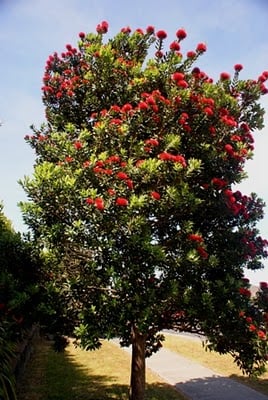
I moved to New Zealand from the UK in 1985. The most difficult aspect of culture change for me was Christmas. In London the holiday had been cold – even snowing. And all the typical holiday food followed suit – turkey, roast potatoes, sprouts. In New Zealand these foods are inappropriate (although it doesn’t stop some expats from continuing with the full works). Most people spend Christmas day on the beach or out in the garden.
Over the years, we have developed our own traditions based on the produce that is around at the time. The star of the show is always strawberries. They are sold at farmer’s markets, PYO (Pick Your Own) from farms and at the side of the road from early November until February. They are in enormous demand at Christmas!
Here is the food that we have planned for this year…..it’s pretty much the same most years actually!
Breakfast
We eat this as we open our presents – a bit of a ritual in our house!
- Strawberry Champagne(Lindauer Frais with strawberry in the glass)
- Homemade Stollen(John makes a fantastic stolen bread with marzipan in the middle – it keeps for weeks!)
Lunch
- Champagne Ham on the Bone(Free range pork glazed with honey and studded with cloves)
- Large mixed salad picked that morning from the garden
- Kumara saladwith mayo (a bit like potato salad but with sweet potato)
- Wholegrain Bread(made by John – he is out bread man!)
- Ice Cream Christmas Puddingserved with lots of strawberries, or Pavlova (a chewy meringue) with strawberry Kiwi fruit topping.
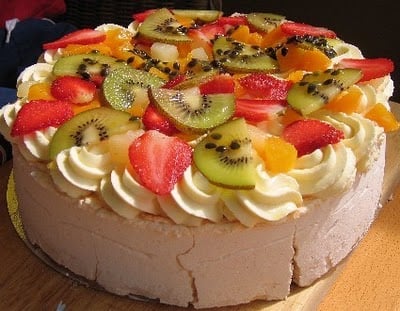
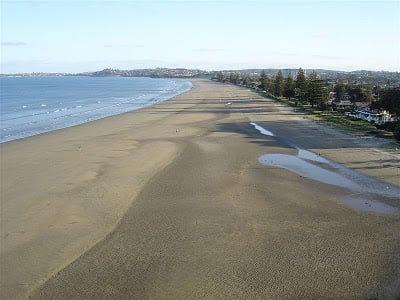
Dinner
This is usually a BBQ featuring:
- Fillet steak and hand-made Pork Sausages(by our local butcher although we are hoping to get a sausage maker)
- Home grown Snow Peas and Beans
- Saladfrom the garden
- Homemade chile sauce(made with home grown chilies)
- Christmas Cakewith no sugar and minimum flour, lots of fruit and nuts (fruitcake) made by me (once I’ve made the cake I’ll ‘feed’ it brandy until Christmas, about 4 weeks!)
- Mince Filo(phyllo) Parcels (I make these as a light alternative to mince pies – and make the mince. This year my mince has been maturing since last Christmas so it should be good!)
- And, of course, Strawberries!

Then we drink wine, play games and talk until bed – then it all starts again on Boxing Day!
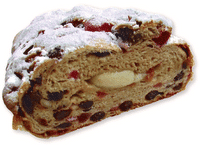
Recipe

Christmas Stollen
Ingredients
- 1 tablespoon dried yeast
- 2/3 cup warm milk
- 1 large egg
- 1/3 cup white sugar
- ½ tablespoon salt
- 1/3 cup butter
- 2 ½ cups bread flour
- 1/3 cup glace cherries
- 2/3 cup diced citron peel
- 6 ounces marzipan (buy real, or make your own)
- 1 tablespoon icing sugar (powdered sugar)
- 1 teaspoon ground cinnamon
Instructions
- Dissolve yeast in warm milk until creamy (about 10 minutes).
- Combine yeast with egg, white sugar, salt, butter and 2 cups bread flour; beat well. Add remaining flour ¼ cup at a time, stirring well.
- When dough pulls together, turn onto lightly floured surface and knead in the fruit. Continue to knead until smooth.
- Oil a large bowl and place dough in it. Cover with damp cloth until risen to double the original size.
- Grease a baking sheet and deflate dough (‘punch down’) and turn out onto floured surface. Roll marzipan into a rope and place in centre of dough.
- Place loaf, seam side down, on greased baking sheet.
- Cover with damp cloth and rise again to twice the size.
- Pre heat oven to 175 C and bake for 10 minutes. Reduce heat to 150C and bake for 30 – 40 minutes.
- Cool on a wire rack and dust with icing sugar and cinnamon before serving.
- This bread keeps in a tin for weeks. We are often eating it at New Year! It toasts very well.
Nutrition
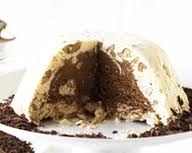
Ice Cream Christmas Pudding
Traditional Christmas pudding is a bit too much for a hot day. This ice cream version looks similar and is great with strawberries. (Note: though this photo is of Ice Cream Christmas Pudding it is not an exact replica of this recipe).
Ingredients
- Double Chocolate Ice Cream (about a litre)
- Vanilla Ice Cream (about ½ litre)
- A handful of Amoretti biscuits (Italian treats made with almonds). If you are not able to get these, you can use sponge fingersto (‘Ladyfingers’ in our Yank parlance)
- A cup of mixed fruits, nuts and cherries soaked over night in brandy or rum
- Icing (‘powdered’) sugar (1 tablespoon)
- A 2 litre basin – stainless steel or pottery.
- Line the basin with cling film (‘plastic wrap’). (This will make it easier to remove the pudding. You can make this straight into the basin but will need to place it into hot water to loosen it before serving). Don’t worry if the cling film is not straight – it won’t notice when the pudding is served.
- Soften the chocolate ice cream until it can be molded. Spoon into the bottom of the basin and carefully mould it up the sides until the entire basin is lined. I try to make it 2mm or more. Retain about 1/3 of the ice cream for sealing the bottom later. Return to the freezer to harden.
- Meanwhile, mix the soaked fruit and biscuits/sponges adding a bit more brandy if it is dry.
- Then mix this with the vanilla ice cream until fruit is evenly distributed.
- Take out the basin and spoon the mixture into the centre of the pudding. Fill to within about 2mm of the top, then carefully spoon the remaining chocolate ice cream over the filling to seal the pudding.
- Put this back into the freezer for at least a couple of hours. I make this a week ahead and then don’t have to worry about it on the day!
When you serve it, remove the film and sieve icing sugar over the top – or melt white chocolate and pour it over the top like snow. I put a sprig of holly on the top of mine and serve with strawberries and strawberry coulis.
Not a weight-watchers dessert but decadent!
Janis explained they do keep traditionally decorated pine trees indoors though look to their seasonal surroundings for the traditional green and red ‘color scheme’; the New Zealand Christmas Trees which line the beaches where they would picnic on Christmas or the strawberry-kiwi topping on the Pavlova. She went on to describe how beastly hot and humid it is right now. That you can almost see the peppers growing, how she’s looking forward to making limoncello this summer and to the blooms of her frangipani cuttings. This all sounds like a dream sequence from a movie as I cannot get the first winter’s chill from my hands and wonder how many layers to put on for a Mid Winter’s Festival tonight at a local biodynamic farm. Could we really be readying ourselves for the same holiday?!
I so love her devotion to all things local, organic, ‘do it yourself’ and green. It reinvigorates that within me as it becomes bogged down by ordinary life logistics. And I think I’ll start by making that Ice Cream Christmas Pudding!
A bit more on Janis…
Janis first visited New Zealand in 1983 and loved it; she moved there from the UK in 1985 where she met and married her ‘Kiwi’ husband John. Janis and John live by the beach in Orewa growing as much as they can in pots! They love growing, cooking and organic principles. They have recently bought 5 acres of land at Matakana, about an hour north of NZ’s largest city, Auckland. They plan to build a sustainable, eco friendly life in the village and sell their produce at the local farmer’s market.
Janis’s day job is as a speaker and business facilitator. Her specialist subject area is workplace wisdom and development of better thinking. You can see her work at www.workplacewisdom.co.nz.

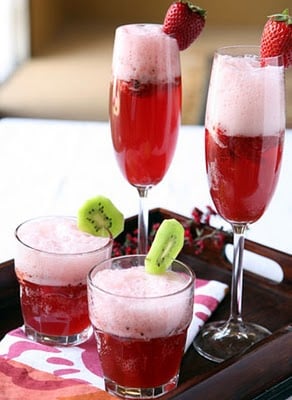
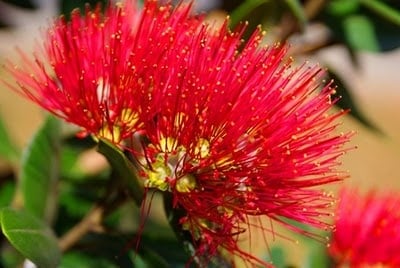
A SPICY PERSPECTIVE says
Great post! The pavlova looks sensational!